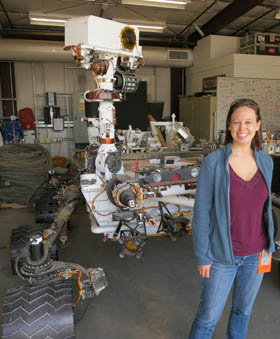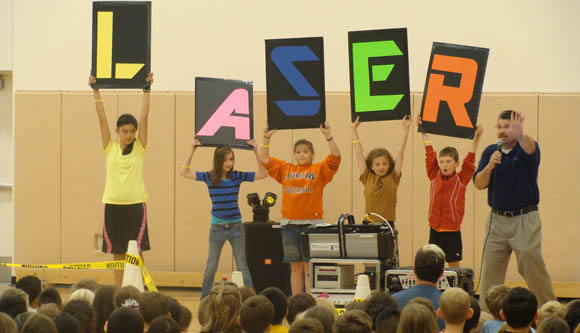Mars Curiosity Rover, lasers will help Compass 2 Campus share STEM awareness
 |
| Melissa Rice and the Mars Curiosity Rover (Photo courtesy Melissa Rice) |
BELLINGHAM, Washington, USA -- What is it like to explore Mars? What do the latest discoveries from the Red Planet tell us about our own past on Earth -- or our future?
Find out in person next month at Western Washington University, via a talk by professor Melissa Rice, one of 400 scientists worldwide to help pilot NASA's Mars Curiosity Rover. Dr. Rice's talk and an entertaining and educational laser show will be presented Tuesday 20 October at 6:30 p.m. in the Performing Arts Center on the Western campus.
The free-admission "Evening of Light" is part of Western's annual Compass 2 Campus outreach day, and sponsored by SPIE, the international society for optics and photonics, as part of the United Nations-decreed International Year of Light 2015.
For advance tickets, call the PAC box office at 360 650 6146. Tickets may be available at the door on the evening of the event, if seats remain.
"Dr. Rice has gained valuable insights and knowledge as a hands-on scientist active in one of the most intriguing space exploration missions now underway," said SPIE CEO Eugene Arthurs. "We are fortunate that she is so generous with her time, and willing to share the excitement and wonder of a branch of science that has fascinated human beings since the earliest of times: looking to the skies and beyond for answers to the mysteries of life."
The laser show presented by Prismatic Magic following Dr. Rice's talk not only will entertain, but will provide a crash course in laser science that demonstrates how lasers are transforming our world, Arthurs said. This will be a return visit to the area for Prismatic Magic, as their Laser Roadshow made well-received visits to several local schools in 2013.
Dr. Rice teaches in the Geology and the Physics and Astronomy departments at Western. Her research focuses on the sedimentology, stratigraphy, and mineralogy of planetary surfaces. The current aim of her work is to help constrain the habitability of ancient environments on Mars.
From its headquarters offices in Bellingham, SPIE serves researchers, engineers, and scientists around the world working in light-based technologies. These technologies have applications as close at hand as the smartphone, through lasers and computer circuitry; out into deep space, with missions such as the Mars Rover and the Kepler and Hubble telescopes; and into the nanosphere, with light-activated particles that detect disease and deliver medication at the cellular level.
"The United Nations chose to declare 2015 the International Year of Light and Light-based Technologies in recognition of the importance of optics and photonics -- the science of light -- in individuals' lives and in solving the challenges that face society," Dr. Arthurs said. "Photonics scientists, researchers, and engineers have helped enable noninvasive surgeries that restore eyesight and kill tumors, solar cells and solid-state lighting that support sustainable energy goals, sensors that detect toxins in our food supplies, telescopes that help us see into the past of the Universe, and much more."
The International Year of Light is helping to raise awareness of rewarding careers in science, technology, engineering, and mathematics, known as STEM, Dr. Arthurs said. "The Compass 2 Campus program is an exceptional example of ongoing initiatives that make a positive difference in promoting STEM fields."
 |
| Cordata Elementary School students learn what the word "laser" means, during a 2013 presentation by Prismatic Magic. |
About SPIE
SPIE is the international society for optics and photonics, an educational not-for-profit organization founded in 1955 to advance light-based science and technology. The Society serves nearly 264,000 constituents from approximately 166 countries, offering conferences and their published proceedings, continuing education, books, journals, and the SPIE Digital Library in support of interdisciplinary information exchange, professional networking, and patent precedent. SPIE provided more than $4 million in support of education and outreach programs in 2014. SPIE is a Founding Partner of the International Year of Light and Light-based Technologies and a Founding Sponsor of the US National Photonics Initiative. www.spie.org
Contact:
Amy Nelson
Public Relations Manager
amy@spie.org
+1 360 685 5478
@SPIEtweets
All photos © SPIE, the international society for optics and photonics, except where noted.